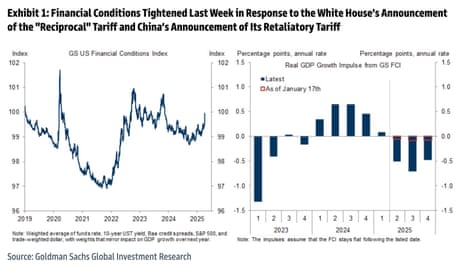2h ago09.04 BST

Helen Davidson
In Taiwan, stocks plummeted so fast on Monday that it triggered the 10% circuit breaker early in the morning, my colleagues Jason Tzu Kuan Lu and Helen Davidson report from Taipei.
The huge falls were driven by Taiwan tech giants TSMC and Foxconn.
Playing the stock market is hugely popular in Taiwan, with about 5.6m of Taiwan’s 24m people actively trading. Individual investors accounted for more than 55% of all transactions in June 2024, according to the Taiwan stock exchange. It means there are a lot of mum and dad investors out there, reeling from the global economic fallout.
At the Muzha market on the outskirts of Taipei, 65-year-old Mr T said he felt like the morning’s routing was an inevitable correction to market rises prior to Trump’s announcement. Monday was the first chance Taiwan’s market had to react to the 32% tariffs he put on the island, having been closed for a national holiday last Thursday and Friday.
“Before the holidays, the market was rising, so now it’s just a normal correction. But we can’t predict where the drop will stop,” he told the Guardian.
“What’s more concerning is the situation with TSMC’s poor performance in the U.S. When TSMC is struggling, everyone else is, too.”
Zhou Tzu-wei, a 34-year-old producer in Taiwan said he’d seen some “plummeting” of the market in the past “but nothing as bad as today”.
““Almost everything is dropped to the limitation of stock price (10%).It feels like the market just closed seconds after its opening. Even companies with factories in the U.S. took a hit. Only basic necessities like gas were less affected (and actually went up).”
Hou Dun-yi, a Taiwan-based actor, said he tried to clear his holdings before the open but “couldn’t sell a single share”.
“I don’t know if something like this has ever happened in the history of the Taiwan stock market. I’m not sure what will happen next, either. Trump is just too unpredictable. Anyway, I plan to sell all my stocks and take a break from trading. I’m going to read more books, do some research, and focus on living with the cash I have for now.”






